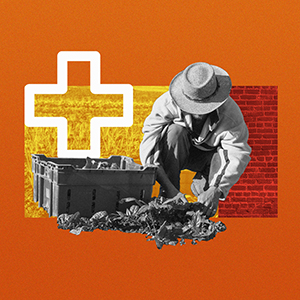Center for Addiction and Recovery Education
Destigmatizing Substance Use Disorder

“How many people know someone who lost their battle with addiction?,” Stephen Forzato, director of Saint Joseph’s Center for Addiction and Recovery Education (CARE), asked a room of volunteers at Allentown’s warming center. Five hands reluctantly raised in the air. It’s a question that more than one million Americans have answered “yes” to in the last 25 years.
In fact, 48.7 million people aged 12 and older have a substance use disorder in the United States, according to the Substance Abuse and Mental Health Services Administration. It’s a staggering statistic that the Center for Addiction and Recovery Education is addressing head on through education and community engagement, research, and public policy.
“It's more important than ever that people learn more about substance use disorder. A little bit of knowledge goes a long way toward building understanding of the disease, and with understanding comes hope and ultimately progress toward healthy outcomes,” says Meghan Burk, MS ’05, associate director of CARE.
Forzato’s trip to the warming center in November was part of CARE’s Phoenix Training program, a peer-to-peer initiative designed to teach first responders and criminal justice professionals how to compassionately approach individuals with substance use disorder and connect them with resources and treatment.
As of December of 2023, CARE’s training team — which includes three retired Pennsylvania state troopers, two former police officers now in practice as mental health clinicians, a firefighter and a retired correctional officer — had trained nearly 8,000 public safety professionals.
They’re also educating future healthcare professionals and teamed up with Saint Joseph’s Institute of Clinical Bioethics in October to train medical residents on the stigma associated with substance use disorder.
“Stigma is how we feel, how we think, how we speak,” said Forzato to the more than 50 students in attendance. “First responders, doctors, nurses, PAs, all of these people who deal with these issues on the front lines have to be very careful about their expressions and the words they choose.”
CARE’s growth and community impact show no signs of slowing down; their grant with the Pennsylvania Department of Health was renewed in October through 2028, and they’re rolling out a training module with the University’s clinical mental health counseling program and Assistant Professor Allison Dukes, PhD, to shed light on how trauma can be linked to addiction.
"Through CARE's nearly five years of training first responders, SJU has built a reputation for providing quality education around substance use disorder,” says Forzato. “Expanding to new audiences would serve the needs of so many more people affected by this health issue."
It's more important than ever that people learn more about substance use disorder. A little bit of knowledge goes a long way toward building understanding of the disease, and with understanding comes hope and ultimately progress toward healthy outcomes.”
Meghan Burk, MS ’05
Associate Director of CARE


